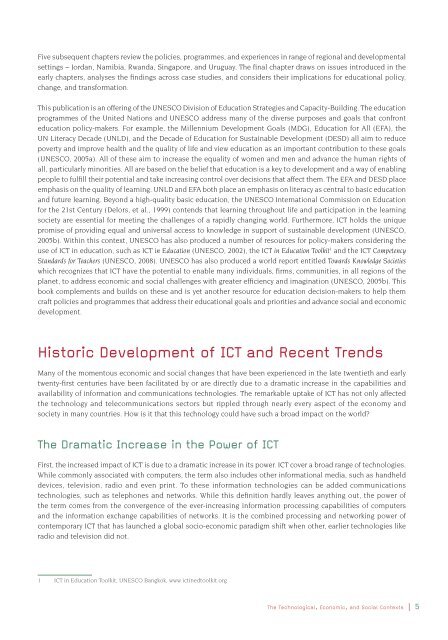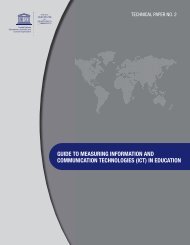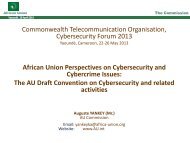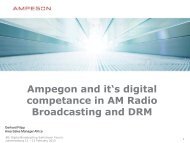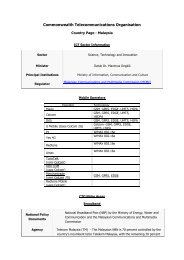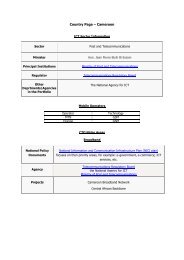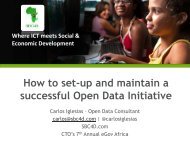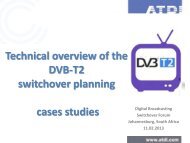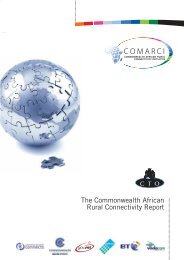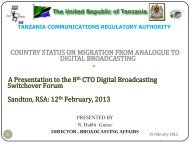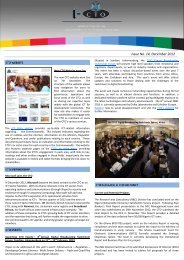Transforming education: the power of ICT policies - Commonwealth ...
Transforming education: the power of ICT policies - Commonwealth ...
Transforming education: the power of ICT policies - Commonwealth ...
Create successful ePaper yourself
Turn your PDF publications into a flip-book with our unique Google optimized e-Paper software.
Five subsequent chapters review <strong>the</strong> <strong>policies</strong>, programmes, and experiences in range <strong>of</strong> regional and developmental<br />
settings – Jordan, Namibia, Rwanda, Singapore, and Uruguay. The fi nal chapter draws on issues introduced in <strong>the</strong><br />
early chapters, analyses <strong>the</strong> fi ndings across case studies, and considers <strong>the</strong>ir implications for <strong>education</strong>al policy,<br />
change, and transformation.<br />
This publication is an <strong>of</strong>fering <strong>of</strong> <strong>the</strong> UNESCO Division <strong>of</strong> Education Strategies and Capacity-Building. The <strong>education</strong><br />
programmes <strong>of</strong> <strong>the</strong> United Nations and UNESCO address many <strong>of</strong> <strong>the</strong> diverse purposes and goals that confront<br />
<strong>education</strong> policy-makers. For example, <strong>the</strong> Millennium Development Goals (MDG), Education for All (EFA), <strong>the</strong><br />
UN Literacy Decade (UNLD), and <strong>the</strong> Decade <strong>of</strong> Education for Sustainable Development (DESD) all aim to reduce<br />
poverty and improve health and <strong>the</strong> quality <strong>of</strong> life and view <strong>education</strong> as an important contribution to <strong>the</strong>se goals<br />
(UNESCO, 2005a). All <strong>of</strong> <strong>the</strong>se aim to increase <strong>the</strong> equality <strong>of</strong> women and men and advance <strong>the</strong> human rights <strong>of</strong><br />
all, particularly minorities. All are based on <strong>the</strong> belief that <strong>education</strong> is a key to development and a way <strong>of</strong> enabling<br />
people to fulfi ll <strong>the</strong>ir potential and take increasing control over decisions that affect <strong>the</strong>m. The EFA and DESD place<br />
emphasis on <strong>the</strong> quality <strong>of</strong> learning. UNLD and EFA both place an emphasis on literacy as central to basic <strong>education</strong><br />
and future learning. Beyond a high-quality basic <strong>education</strong>, <strong>the</strong> UNESCO International Commission on Education<br />
for <strong>the</strong> 21st Century (Delors, et al., 1999) contends that learning throughout life and participation in <strong>the</strong> learning<br />
society are essential for meeting <strong>the</strong> challenges <strong>of</strong> a rapidly changing world. Fur<strong>the</strong>rmore, <strong>ICT</strong> holds <strong>the</strong> unique<br />
promise <strong>of</strong> providing equal and universal access to knowledge in support <strong>of</strong> sustainable development (UNESCO,<br />
2005b). Within this context, UNESCO has also produced a number <strong>of</strong> resources for policy-makers considering <strong>the</strong><br />
use <strong>of</strong> <strong>ICT</strong> in <strong>education</strong>, such as <strong>ICT</strong> in Education (UNESCO, 2002), <strong>the</strong> <strong>ICT</strong> in Education Toolkit 1 and <strong>the</strong> <strong>ICT</strong> Competency<br />
Standards for Teachers (UNESCO, 2008). UNESCO has also produced a world report entitled Towards Knowledge Societies<br />
which recognizes that <strong>ICT</strong> have <strong>the</strong> potential to enable many individuals, fi rms, communities, in all regions <strong>of</strong> <strong>the</strong><br />
planet, to address economic and social challenges with greater effi ciency and imagination (UNESCO, 2005b). This<br />
book complements and builds on <strong>the</strong>se and is yet ano<strong>the</strong>r resource for <strong>education</strong> decision-makers to help <strong>the</strong>m<br />
craft <strong>policies</strong> and programmes that address <strong>the</strong>ir <strong>education</strong>al goals and priorities and advance social and economic<br />
development.<br />
Historic Development <strong>of</strong> <strong>ICT</strong> and Recent Trends<br />
Many <strong>of</strong> <strong>the</strong> momentous economic and social changes that have been experienced in <strong>the</strong> late twentieth and early<br />
twenty-fi rst centuries have been facilitated by or are directly due to a dramatic increase in <strong>the</strong> capabilities and<br />
availability <strong>of</strong> information and communications technologies. The remarkable uptake <strong>of</strong> <strong>ICT</strong> has not only affected<br />
<strong>the</strong> technology and telecommunications sectors but rippled through nearly every aspect <strong>of</strong> <strong>the</strong> economy and<br />
society in many countries. How is it that this technology could have such a broad impact on <strong>the</strong> world?<br />
The Dramatic Increase in <strong>the</strong> Power <strong>of</strong> <strong>ICT</strong><br />
First, <strong>the</strong> increased impact <strong>of</strong> <strong>ICT</strong> is due to a dramatic increase in its <strong>power</strong>. <strong>ICT</strong> cover a broad range <strong>of</strong> technologies.<br />
While commonly associated with computers, <strong>the</strong> term also includes o<strong>the</strong>r informational media, such as handheld<br />
devices, television, radio and even print. To <strong>the</strong>se information technologies can be added communications<br />
technologies, such as telephones and networks. While this defi nition hardly leaves anything out, <strong>the</strong> <strong>power</strong> <strong>of</strong><br />
<strong>the</strong> term comes from <strong>the</strong> convergence <strong>of</strong> <strong>the</strong> ever-increasing information processing capabilities <strong>of</strong> computers<br />
and <strong>the</strong> information exchange capabilities <strong>of</strong> networks. It is <strong>the</strong> combined processing and networking <strong>power</strong> <strong>of</strong><br />
contemporary <strong>ICT</strong> that has launched a global socio-economic paradigm shift when o<strong>the</strong>r, earlier technologies like<br />
radio and television did not.<br />
1 <strong>ICT</strong> in Education Toolkit, UNESCO Bangkok, www.ictinedtoolkit.org<br />
The Technological, Economic, and Social Contexts | 5


